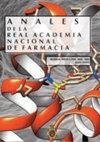Therapeutic repositioning: importance of new therapeutic indications approved for old medicines
Q Pharmacology, Toxicology and Pharmaceutics
Anales De La Real Academia Nacional De Farmacia
Pub Date : 2024-07-01
DOI:10.53519/analesranf.2024.90.02.06
引用次数: 0
Abstract
In the field of health and, particularly in biomedicine, continuous reevaluation has allowed us to see with a different attitude what was apparently known; A large part of the medicines from synthetic chemistry, biotechnology and advanced therapies (genetics, somatics, tissue engineering, etc.) are a clear example of this. The search and investigation of new applications for drugs already approved and in clinical use – and even for compounds that did not reach the clinical research phases at the time – is usually called “repositioning”, which makes it possible to have drugs with a profile of safety and efficacy already known, which represents a significant saving in time and development costs and, sometimes, is the only way to develop therapies for rare diseases, as orphan indications. In fact, it is estimated that a substantial part of the known drugs may have new therapeutic uses and that drugs currently in clinical use could be used for numerous applications other than those for which they were originally approved. The high number of authorizations of new indications or their extensions or modifications by the EMA and the FDA, in relation to that of medicines with new active ingredients, highlights that pharmacological research – basic and clinical – does not end with the marketing authorization of a medicine but, on the contrary, there are many that continue to be the subject of extensive and intensive research by their titular laboratories in order to extract the maximum knowledge and health results from products whose development has a very high economic cost and requires large and multidisciplinary human research teams. In order to examine the current innovative activity in the field of new indications for medicines previously authorized in the European Union, we have proceeded to systematically collect and study the contents of all the summaries of the 36 plenary meetings of the Committee for Medicinal Products for Human Use (CHMP) published by the EMA between January 2021 and March 2024, in which 258 positive recommendations for extension of indications were made, for a total of 181 medicines from 74 laboratories. Keywords: Pharmacology; therapeutic repositioning; clinical research; drug authorization; drug evaluation治疗重新定位:旧药品获批新治疗适应症的重要性
在健康领域,尤其是在生物医学领域,不断的重新评估使我们能够以不同的态度来看待已知的事物;合成化学、生物技术和先进疗法(遗传学、体细胞学、组织工程学等)中的大部分药物就是一个明显的例子。对已获批准并投入临床使用的药物--甚至是当时尚未进入临床研究阶段的化合物--进行新用途的探索和研究,通常被称为 "重新定位",这使得药物的安全性和有效性概况已经为人所知,从而大大节省了时间和开发成本,有时也是开发罕见疾病(孤儿适应症)疗法的唯一途径。事实上,据估计,相当一部分已知药物可能具有新的治疗用途,目前正在临床使用的药物可以用于其最初批准用途之外的许多其他用途。欧洲药品管理局(EMA)和美国食品和药物管理局(FDA)批准的新适应症或其延期或修改的数量之多,与含有新有效成分的药物的数量之多相比,突出表明了药理学研究--基础和临床研究--并没有随着一种药物的上市许可而结束,相反,有许多药物仍然是其名下实验室广泛而深入研究的对象,以便从产品中获取最大的知识和健康成果。为了研究目前在欧盟已获批准药品的新适应症领域的创新活动,我们着手系统地收集和研究了欧洲药品管理局(EMA)在 2021 年 1 月至 2024 年 3 月期间发布的人用医药产品委员会(CHMP)36 次全体会议的所有摘要内容,其中对 74 个实验室的 181 种药品提出了 258 项延长适应症的积极建议:药理学;治疗重新定位;临床研究;药品授权;药品评估
本文章由计算机程序翻译,如有差异,请以英文原文为准。
求助全文
约1分钟内获得全文
求助全文
来源期刊

Anales De La Real Academia Nacional De Farmacia
Pharmacology-
CiteScore
0.13
自引率
0.00%
发文量
7
期刊介绍:
The Anales de la Real Academia Nacional de Farmacia� embraces all aspects of pharmaceutical sciences and is a quarterly journal that publishes basic and applied research on pharmaceutical sciences and related areas. It is a medium for reporting selected original and significant contributions to new pharmaceutical knowledge.
 求助内容:
求助内容: 应助结果提醒方式:
应助结果提醒方式:


